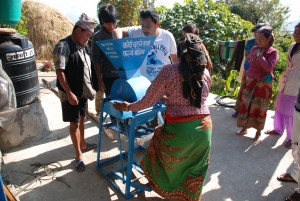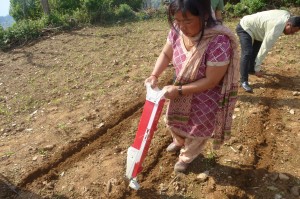Canadian universities and project partners awarded $2.6M in funding from the International Development Research Centre (IDRC) and the Government of Canada’s Foreign Affairs, Trade and Development Canada (DFATD).
Principal investigators are Dr. Pashupati Chaudhary from Local Initiatives for Biodiversity, Research and Development (LI-BIRD), Dr. Ram Rana from Anamolbiu Private Limited, and Manish N. Raizada from the University of Guelph.
Research partners include Dr. Kirit Patel, Assistant Professor of International Development Studies at Menno Simons College (MSC), a college of Canadian Mennonite University (CMU); Plant Products Company Inc.; XiteBio Technologies Inc.; iDE Canada and iDE Nepal; and the Nepal Agricultural Research Council.
The project is titled “Innovations for Terrace Farmers in Nepal and Testing of Private Sector Scaling Up Using Sustainable Agriculture Kits (SAKs) and Stall-Based Franchises (Nepal Terrace Farmers and SAKs).”
SAKs are toolkits that contain three components: seeds, low-cost agricultural technology, and instructional picture books. The kit contents vary by region and are chosen through local consultation to meet each region’s specific agroecological, socioeconomic, and nutritional needs.
 The SAK project builds upon experience gained from a previous project, funded by the IDRC and DFATD and of which Patel was a principal investigator, on promoting small millets cultivation, production and consumption for enhancing food security in South Asia.
The SAK project builds upon experience gained from a previous project, funded by the IDRC and DFATD and of which Patel was a principal investigator, on promoting small millets cultivation, production and consumption for enhancing food security in South Asia.
The SAK project began in August 2014 and will run for two and a half years with the focus on non-monetary or low cost “technological developments for small Nepalese farmers who are growing subsistence crops on hillsides,” says Patel.
CMU will provide support for participatory analysis of technological constraints faced by small and marginal farmers and examining the impacts new technologies introduced by the project have on women farmers.
“As a social scientist, I try to understand the agrarian context,” he says. “We see many young farmers are leaving rural areas and women are left in the household to do the farming.”
Added workload for female farmers is just one of the challenges facing Nepalese terrace farmers. Other challenges are limited land for cultivation, limited irrigation facilities, loss in soil fertility and deficiency in nutrients, water runoff from sloping land, and soil erosion.
 The project will address these challenges by: improving soil fertility, promoting climate change resilient crops, empowering and strengthening the resiliency of local innovators/farmers, using technology to assess farmers’ needs and collect feedback, and seeking ways to scale up the aforementioned technologies for inclusion in SAKs.
The project will address these challenges by: improving soil fertility, promoting climate change resilient crops, empowering and strengthening the resiliency of local innovators/farmers, using technology to assess farmers’ needs and collect feedback, and seeking ways to scale up the aforementioned technologies for inclusion in SAKs.
The project will operate using a participatory model, inviting input and knowledge from local farmers, local development organizations, entrepreneurs, and the private sector.
“The farmers have a role in the project—identifying problems and possible solutions,” says Patel. He is also seeking the participation of MSC students who would like to complete a research-oriented practicum or honours thesis in Nepal.
About CMU
A Christian university in the Anabaptist tradition, CMU’s Shaftesbury campus offers undergraduate degrees in arts, business, humanities, music, sciences, and social sciences, as well as graduate degrees in theology, ministry, peacebuilding and collaborative development, and an MBA. CMU has over about 900 full-time equivalent students, including those enrolled in degree programs at the Shaftesbury and Menno Simons College campuses and in its Outtatown certificate program.
For information about CMU visit www.cmu.ca.
For additional information, please contact:
Kevin Kilbrei, Director of Communications & Marketing
kkilbrei@cmu.ca; 204.487.3300 Ext. 621
Canadian Mennonite University
500 Shaftesbury Blvd., Winnipeg, MB R3P 2N2
